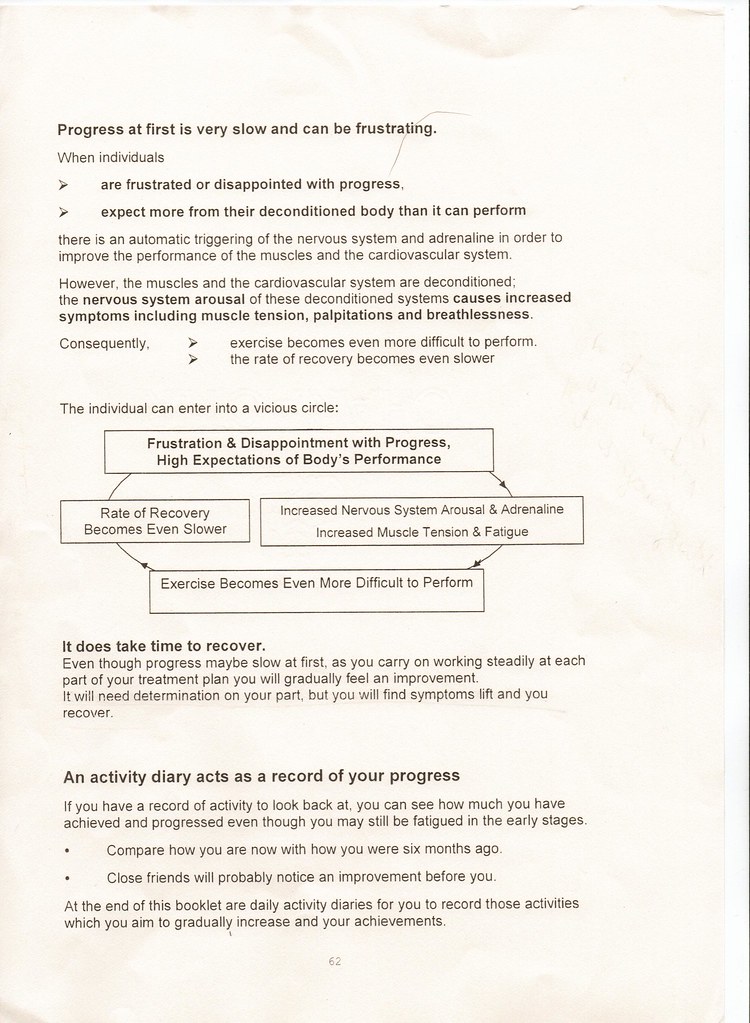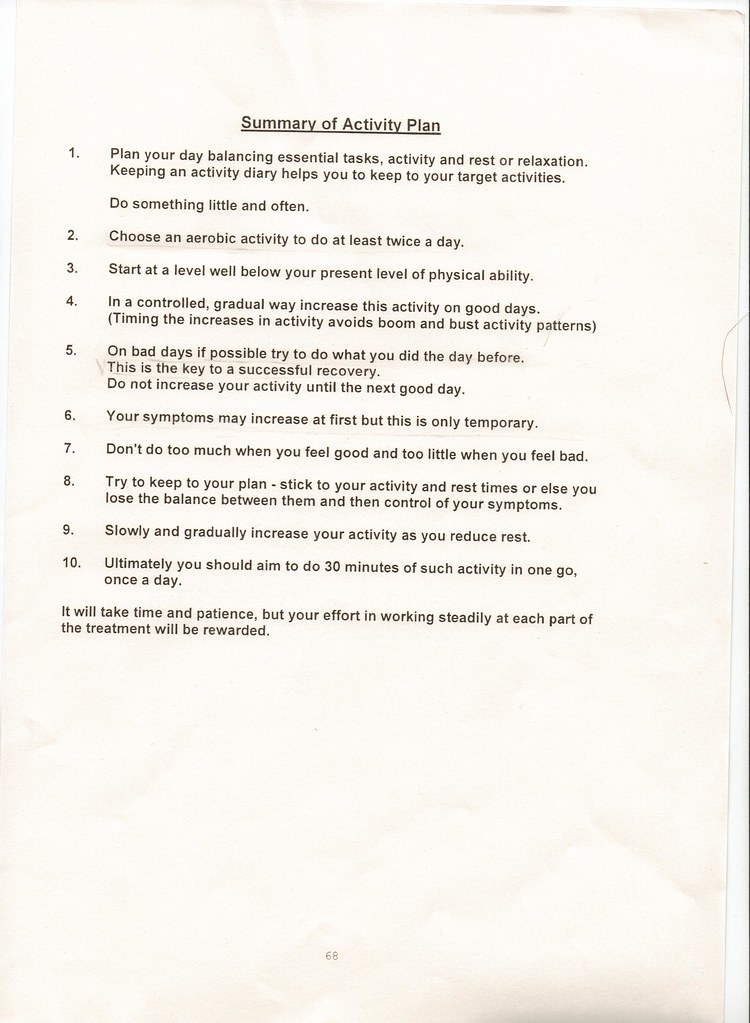Chapt 8 cont. Severe patients
[Orla - The GET studies (admitedly with either no objective markers or poor results when they do use them) have been done on mobile, or fairly mobile, non-severe patients.
Personally I think they are suggesting a plan for the severe which is basically inappropriate, and could make the person worse. Most ME/CFS patients, including the severe, are already doing all they can, out of boredom if nothing else! Obviously if someone improves they might start to do a bit more, and increasing activities gradually is probably better, but these people are not talking about waiting until after one feels better to start a programme, but wanting the patients just to start now, as they think our symptoms are the result of deconditioning.
Even though some of the activities probably wouldn't sound like much to them they are talking about the patient doing things like standing, and repetitive actions/exercises. This is in order, in their eyes, to build up strength. Of course this is not necessarily how it works in ME/CFS , as attempts to build up this way can lead to the person becoming even worse/weaker.
In ME/CFS there is an abnormal reaction to exercise that an underlying physical disease is causing. If severe ME/CFS patients are deconditioned it is as because of the condition causing them to be restricted, not the other way around. Muscle wastage is very rare in ME/CFS, and splints and things can be used to stop some problems, rather than exercise. I know someone who did very gentle passive physio for a while and it left them much worse for about a year.]
[Orla - now CFS is a problem, not an illness? They give examples of what they think are appropriate exercises.]
[Orla - I know it doesn't sound like much but for someone bed-bound it could be quite strenuous to do this sort of repetitive activity. I would find this quite difficult to do and I am not bed-bound (though I lie down a lot during the day), but even when I was better than I am now I would find ths sort of thing diffcult. If I overdo it with my hands with doing repetitive activities I end up getting muscle twitching. I think a lot of people with ME find repetitive activities difficult, probably partly because of the delayed recovery from exercise.
One thing that bothers me with their stupid suggestions is that if patients are using energy on these exercises it means they don't have it for other more enjoyable things, like spending a short time on a computer, writing to friends etc.]
[Orla - I don't know about anyone else but I find raising my arms over my head makes me feel fairly instantly weak and dizzy. I think this might have something to do with the pressure it puts on the body to circulate blood, but I am not sure. If I want to feel awful, this is a sure fired way of doing it!
Below: They want the very severe to increase their sitting and standing times gradually. They are assuming that people can gradually increase activity over time, and that there is no ceiling to the person's activity levels (this is a problem with GET, in that it assumes we can just increase to normal)]:
[Orla - If it was that simple everyone would be doing it. They say that the patient might experience some symptoms when they start to do the exercises, but of course this is put down to deconditioning. They claim that the symptoms will subside when the patient becomes fitter and stronger]
[Orla - Tiredness!!!!]
[Orla - The GET studies (admitedly with either no objective markers or poor results when they do use them) have been done on mobile, or fairly mobile, non-severe patients.
Personally I think they are suggesting a plan for the severe which is basically inappropriate, and could make the person worse. Most ME/CFS patients, including the severe, are already doing all they can, out of boredom if nothing else! Obviously if someone improves they might start to do a bit more, and increasing activities gradually is probably better, but these people are not talking about waiting until after one feels better to start a programme, but wanting the patients just to start now, as they think our symptoms are the result of deconditioning.
Even though some of the activities probably wouldn't sound like much to them they are talking about the patient doing things like standing, and repetitive actions/exercises. This is in order, in their eyes, to build up strength. Of course this is not necessarily how it works in ME/CFS , as attempts to build up this way can lead to the person becoming even worse/weaker.
In ME/CFS there is an abnormal reaction to exercise that an underlying physical disease is causing. If severe ME/CFS patients are deconditioned it is as because of the condition causing them to be restricted, not the other way around. Muscle wastage is very rare in ME/CFS, and splints and things can be used to stop some problems, rather than exercise. I know someone who did very gentle passive physio for a while and it left them much worse for about a year.]
For those with a very severe CFS problem
[Orla - now CFS is a problem, not an illness? They give examples of what they think are appropriate exercises.]
"Squeezing a stress ball or body scrub sponge every couple of hours starting with five times and gradually increasing the number of repetitions."
[Orla - I know it doesn't sound like much but for someone bed-bound it could be quite strenuous to do this sort of repetitive activity. I would find this quite difficult to do and I am not bed-bound (though I lie down a lot during the day), but even when I was better than I am now I would find ths sort of thing diffcult. If I overdo it with my hands with doing repetitive activities I end up getting muscle twitching. I think a lot of people with ME find repetitive activities difficult, probably partly because of the delayed recovery from exercise.
One thing that bothers me with their stupid suggestions is that if patients are using energy on these exercises it means they don't have it for other more enjoyable things, like spending a short time on a computer, writing to friends etc.]
Raising your arms with the eventual aim of lifting them above your head. Doing this two or three times a day and gradually increasing the number of arm raises." (p55)
[Orla - I don't know about anyone else but I find raising my arms over my head makes me feel fairly instantly weak and dizzy. I think this might have something to do with the pressure it puts on the body to circulate blood, but I am not sure. If I want to feel awful, this is a sure fired way of doing it!
Below: They want the very severe to increase their sitting and standing times gradually. They are assuming that people can gradually increase activity over time, and that there is no ceiling to the person's activity levels (this is a problem with GET, in that it assumes we can just increase to normal)]:
Gradually increase walking time by starting with two paces away from the sofa or bed and two paces back. Over time this can be gradually increased and then timed in seconds. As you improve you can take your walk around the house.
[Orla - If it was that simple everyone would be doing it. They say that the patient might experience some symptoms when they start to do the exercises, but of course this is put down to deconditioning. They claim that the symptoms will subside when the patient becomes fitter and stronger]
...you can expect to experience generalized muscle aches and tiredness
[Orla - Tiredness!!!!]


